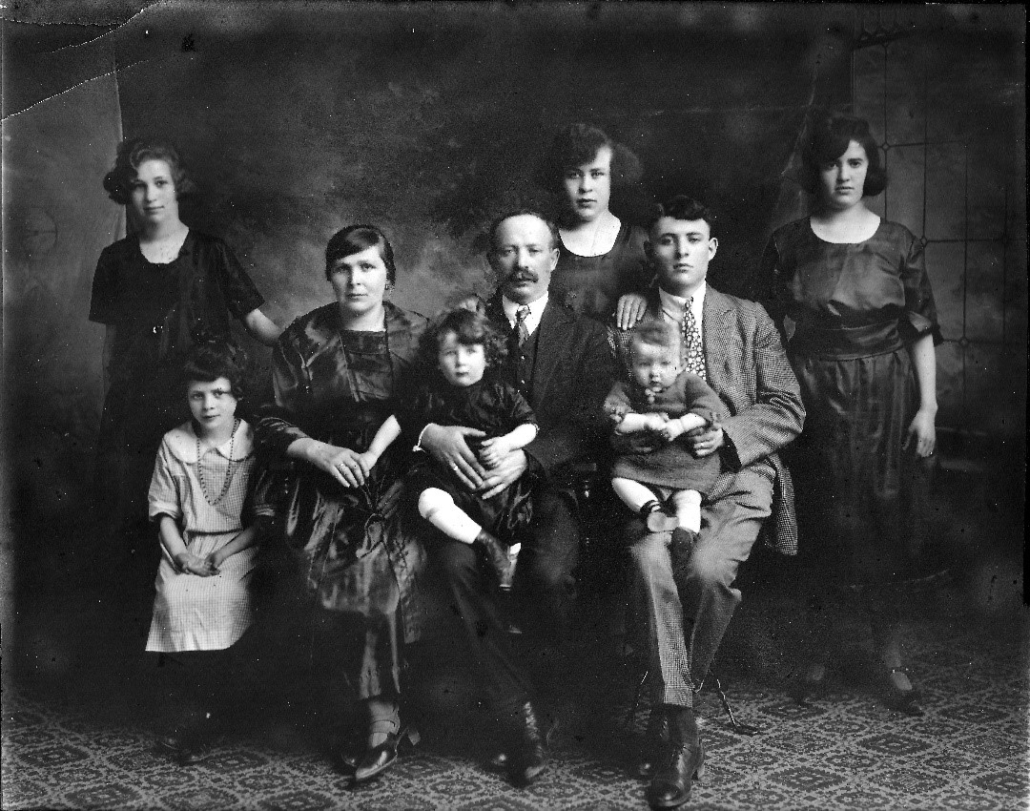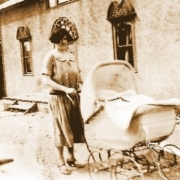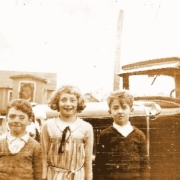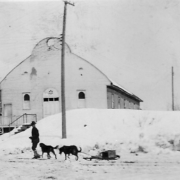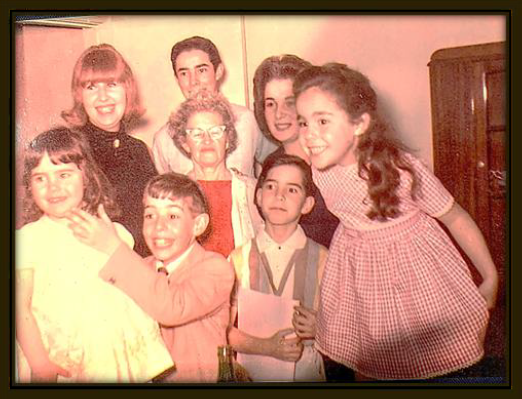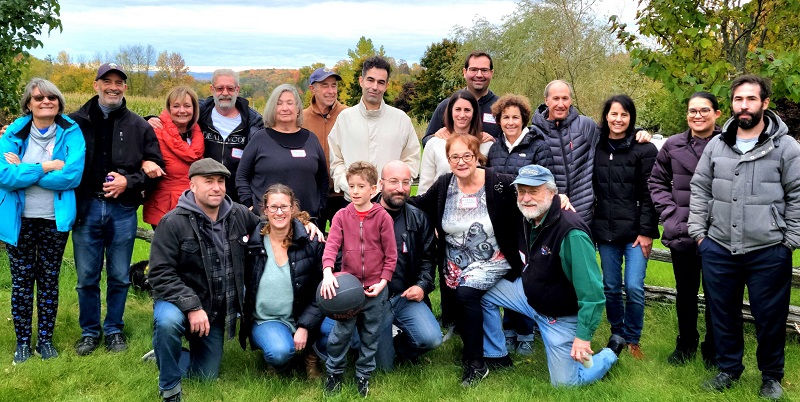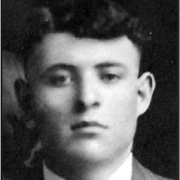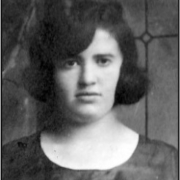Celebrating 100 Years of my Family in Canada
By: Karen (Greenberg) Mock
Last week, on a beautiful fall day Erev Sukkot, my first cousins and I gathered from far and wide with our children and grandchildren, (including several by zoom who couldn’t travel) to celebrate 100 years since our grandparents arrived in Canada from Poland.
As my Boobie used to tell us, it was a long and difficult journey for a pregnant Etka and her young husband, Mayer. They left almost everything behind in their stetdl of Glowaczow near Radom (Glovitz in Yiddish), travelling by horse-drawn cart to Strzyżyna to board the train to Warsaw, where they booked their tickets for the remainder of the trip — third class steerage tickets that included some food: black bread, herring, and water. It was an arduous train ride from Warsaw to Berlin and then on to Hamburg to board the ship that would take them to Hull, England.
By 1922, the various Jewish communities along the migrant route in Europe had become well organized, in the same way as JIAS was created in 1922 to play that role in Canada. They provided showers, meals, new clothes, sleeping accommodations, medical assistance, and most importantly, kosher food for the travellers. In Berlin, members of the city’s Jewish Relief Committee distributed tea, kosher bread and soup, and provided medical attention to those who needed it.
Once in Hamburg, the local Jewish Relief Committee again came to the aid of the migrants, providing meals, simple accommodation, medical care and even steamship tickets. After five to six days confined in a crowded train carriage, everyone needed to visit the public baths, get de-loused and choose new clothing. They also had to stock up on kosher provisions for the upcoming voyage. They worried, as well, about passing the multiple inspections they faced. Each passenger was closely examined at each stop along the way since shipping agents were required to certify the health and intellectual fitness of all passengers. When they arrived in Hull, England a day or two later, they were taken directly from the ship to a waiting room on the docks, where there were bathing facilities. After a brief rest, the travellers boarded a special train for ‘transmigrants’ that took them straight across England to the busy port of Liverpool, a journey of about 7 hours. They had to wait several days there for their ship, confined on the train. And again they faced a medical inspection and another bout of de-lousing.
Majer and Etka crossed the Atlantic on the SS Canada on June 17, 1922, arriving 9 days later at a port near Quebec City. They were again questioned and inspected by immigration officers and medical personnel. But this time they were denied entry and detained at what is now known as Quarantine Island, or Grosse Isle. They appealed and were “admitted by permit” on the 30th of June, 1922. When questioned by immigration officers, both Majer, a shoemaker by trade, and Etka, stated that they were tailors, as they had been advised that tailors were in high demand in Canada at that time. Holy Blossom’s Max Enkin was instrumental in what came to be known as the Tailor Project, which helped many Jewish immigrants fleeing from antisemitic Europe find refuge in Canada.
From Quebec, they took the train to Montreal, then on to Toronto, and finally to their destination in Timmins, where Majer’s parents and four younger siblings greeted them. The Greenberg family of Glovitz was united once again.
Why Timmins? It was at the epicentre of Canada’s largest gold and silver deposits. Each month, thousands poured into the city to work in the mines. The Jewish immigrants, who were skilled workers and merchants, opened barbershops, shoe repair shops, dry goods and second-hand stores.
The Greenberg Family – Timmins, 1923 (Mayer and Etka on the right)
When Majer and Etka arrived, they settled into a few rooms over a store where Majer opened a shoe repair shop. Boobie Etka said it was like the “Wild West” with gambling, drinking and prostitution just beyond the town limits, which was only two blocks away from where they lived. Within a few years, Majer and Etka Greenberg (now Max and Ethyl), and their three children, moved to the main street where they opened a second-hand store. With an ever-ending stream of new miners, who needed all the basics (bedding, mattresses, boots, clothes) the Greenbergs did very well selling and then buying everything back when the workers’ contracts were completed. They had a steady income from inventory that could be sold over and over again.
But Ethyl wasn’t happy in Timmins. She wanted to move the family to Toronto where there was a larger Jewish population. As my Auntie Rose told us: in 1931, they were actually on their way to Toronto, when Max met someone from Kirkland Lake at the crossroads. With a huge gold discovery in Kirkland Lake, they ended up opening another store there where their fourth child was born.
Boobie Etka and Isie (my father) in Timmins
Uncle Chaim (Hy), Auntie Rose, and Isie
Timmins Synagogue 1922
It wasn’t until 1937 that the Greenberg family moved south — first to Hamilton, and then on to Toronto. Max continued to prosper, eventually owning a car dealership and properties in Burlington, Mississauga, and Wasaga Beach. Boobie Etka was happy in Toronto’s west end, finally moving to where her four children, and eventually seven grandchildren (the ones who gathered last week to honour their courage and tenacity 100 years ago) could be part of a large Jewish community.
Boobie Etka and her 7 Grandchildren – Pesach 1963
In the 1960s, Boobie went to see Fiddler on the Roof with her family at the then-O’Keefe Centre. As the actors were lighting the Sabbath candles on stage, my cousin Carolyn heard her whisper in amazement “Imagine that!” Boobie Etka could not believe she had lived to witness the day when candles could be lit in public. She came from a shtetl in Poland, where she lived without running water or electricity; where she learned to cook on a wood stove that heated the little wooden house; where she lived through pogroms and a war. She left, and she lived, while her entire extended family was murdered just because they were Jewish. My Boobie and Zadie’s journey from Poland to Canada in 1922 was a leap of faith, that must have been comparable to the astronauts’ trip to the moon! They made many sacrifices and endured a multitude of physical and emotional hardships to ensure that their children and their grandchildren and great-children, who gathered to celebrate last week, could live a Jewish life without the fear they had known.
Greenberg Family Reunion 2022
Erev Sukkot and Thanksgiving 2022, Max and Etka’s descendants gathered together for a family reunion. We raised our glasses in a heartfelt le’chaiyim to honour them, and to give thanks for their courage 100 years ago, coming to this wonderful country in which we are so proud and grateful to live and to be able to carry on the Jewish traditions they passed on to us.
Max David Greenberg 1902 – 1969
Etka Potaznik Greenberg 1901-1975
May their memories be for a blessing

